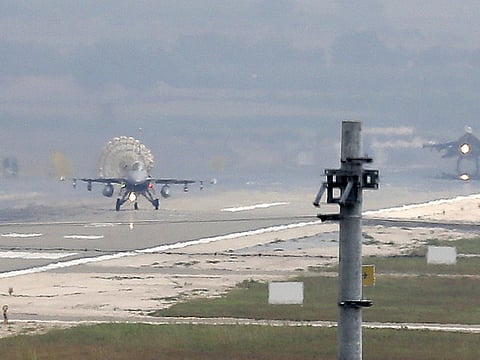Turkey’s motives for action in Syria
The scope and scale of its intervention will be decided chiefly by the outcome of negotiations to form a coalition government in Turkey

After nearly a year of difficult talks, Turkey has agreed to allow the Pentagon to use its military bases and airspace in the war against Daesh (the self-proclaimed Islamic State of Iraq and the Levant). In return, the US has agreed to support Turkey’s endeavours to establish a de-facto “safe zone” in the northwestern part of Syria. The US-Turkish understanding came a few days only after a July 21 suicide bombing, carried out by Daesh, that killed 32 young activists in Turkey, in the border town of Suruc. The Suruc attack provided Ankara with the casus belli it needed to intervene militarily in Syria to challenge the threats posed by both Daesh and the Kurdish Workers’ Party (PKK) operating out of Syrian and Iraqi territories.
Since the fall of Mosul on June 10, 2014, Turkey has turned down several US requests to use the Incirlik air base, which hosts advanced Nato military equipments, in the war against Daesh. Turkey’s refusal complicated the US military efforts; as it had to fly attack missions to confront Daesh on Syrian territories from air bases located as far afield as Bahrain. The Turkish position reflected fundamental disagreement between Ankara and Washington about the nature of the conflicts presently under way in Iraq and Syria, and the means to deal with them.
Turkey presented the US with three conditions to join the international coalition military efforts against Daesh. They included the removal of the regime of Syrian president Bashar Al Assad, the establishment of a safe zone in the north and northwestern part of Syria, and supporting the establishment of a credible Syrian military opposition to fight both the Syrian regime and Daesh.
The Obama administration, which was overwhelmingly occupied with reaching a deal with Iran over its nuclear programme, refused to meet Turkey’s conditions. Washington decided in fact not to provoke an adversary — Iran — instead of pleasing a long-time Nato ally — Turkey. To add insult to injury, Washington ignored Turkish objections and opted for supporting and building up the military force of the Syrian Kurdish Democratic Union Party (PYD) — an offshoot of Turkey’s PKK. The group, which is designated as a terrorist organisation by both Turkey and the US, was able to rely on American military and financial support to evict Daesh from Kobani, Tel Abyad and more recently from Hasakeh.
US policy has enabled the PYD to establish a territorial continuity across its previously dispersed strongholds in the north and northeast part of Syria. The PYD was emboldened enough to even consider capturing areas as far afield west as Aleppo, making the group’s ambitions of establishing a “self-governing zone” — along the Syrian-Turkish borders — a more feasible reality. The rise of the PYD as a political-military force in the north of Syria has also led to the revival of national sentiments amongst Turkey’s Kurdish minority. This alarming devolvement was reflected in the results of Turkey’s latest legislative elections last June, when a majority of Turkey’s Kurds voted for the People’s Democratic Party (HDP), thus taking the pro-Kurdish political party past the electoral threshold and into parliament for the first time in the history of the Turkish republic.
Over the past year, Turkey was observing the fighting between the PYD and Daesh from a comfortable place; a war of attrition that has depleted both sides’ capabilities. Yet, Daesh endeavours to control Azaz, a vital crossing point for pro-Turkey Syrian rebels into Turkish territory in the middle of May, and the capture of Tel Abyad by Kurdish PYD fighters a month later altered Ankara’s calculus.
Taken together, these new developments brought the US and Turkey’s positions closer together, with both countries opting to realise some of their aims through cooperation. The US gains invaluable Turkish intelligence and military support in the fight against Daesh, while Turkey gains the free hand in confronting Kurdish aspirations for independence. Additionally, the establishment of a de facto “safe zone” would allow Turkey not only to equip and train moderate Syrian rebels to fight the regime of President Bashar Al Assad, but also to provide a safe haven for tens of thousands of Syrian refugees, and thus relieving Turkey from some of the security and economic burdens it currently shoulders.
Indeed, the scope and scale of Turkey’s military intervention in Syria will be decided by many considerations, chief among them is the outcome of the ongoing negotiations to form a coalition government in Turkey. The kind and amount of political and economic price Turkey will have to pay for its intervention in Syria will also be important in this regard. Finally, a lot will depend on the change the US is willing to allow in the Levant in general and in Syria in particular.
Dr Marwan Kabalan is a Syrian academic and writer.
Sign up for the Daily Briefing
Get the latest news and updates straight to your inbox


